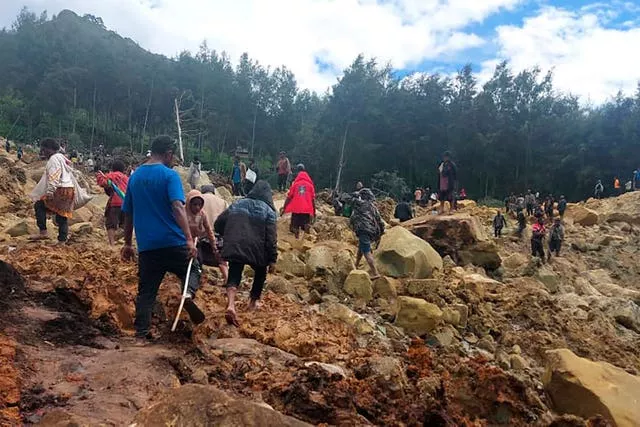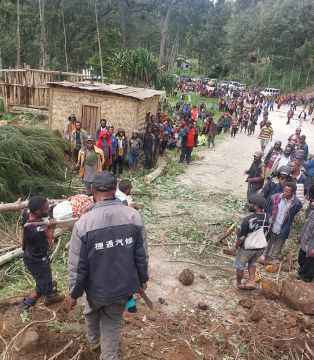An emergency convoy is delivering food, water and other provisions to survivors of a landslide that devastated a remote village in the mountains of Papua New Guinea, with scores of people feared buried.
An assessment team reported “suggestions” that 100 people were dead and 60 houses buried by the mountainside that collapsed in Enga province a few hours before dawn on Friday, officials said.
Serhan Aktoprak, the chief of the International Organisation for Migration’s mission in the South Pacific island nation, conceded that if the number of buried houses estimated by local authorities was correct, the death toll could be higher.
“The scale is so big, I wouldn’t be surprised if there would be more casualties than the earlier reported 100,” Mr Aktoprak said.
We are heartbroken about the massive landslide that struck Yambali village, Enga Province, Papua New Guinea, early this morning.
IOM is already on the ground, ready to help with shelter, food, and water as the difficult rescue and recovery efforts get underway.Advertisement— IOM - UN Migration 🇺🇳 (@UNmigration) May 24, 2024
“If 60 houses had been destroyed, then the number of casualties would definitely be much higher than the 100.”
Only three bodies had been recovered by early on Saturday from the vast swathe of earth, boulders and splintered trees that struck Yambali, a village of nearly 4,000 people that is 370 miles north-west of the capital, Port Moresby.
Medical treatment was provided to seven people, including a child, Mr Aktoprak said. He had no information about the extent of their injuries.
“It is feared that the number of casualties and wounded will increase dramatically,” he added.
Papua New Guinea’s Prime Minister James Marape said on Friday he would release information about the scale of the destruction and loss of life when it becomes available.

All food gardens that sustain the village’s subsistence farming population were destroyed and the three streams that provide drinking water were buried by the landslide, which also blocked the province’s main road.
A convoy left the provincial capital of Wabag carrying food, water and other essentials to the devastated village 35 miles away, Mr Aktoprak said.
Village local Andrew Ruing said the survivors were in desperate need.
“People = they cannot cry or they cannot do anything, because it’s difficult for them,” Mr Ruing said in a video shown by Australian Broadcasting Corp.
“Because such a situation has never happened in history. And therefore, we are calling on the national government, the people on the ground, or the business houses, the heights from everywhere, anywhere – we are seeking assistance from.”
All Australians grieve for our brothers and sisters in Papua New Guinea after the terrible landslide.
We send our deepest condolences to those affected. Australia stands ready to assist.— Anthony Albanese (@AlboMP) May 25, 2024
Mr Aktoprak said that besides food and water, the villagers had an urgent need for shelters and blankets. Relief would be targeted to the most vulnerable, including children, women, and disabled and older people, he said.
The landslide debris, estimated at 20 to 26ft deep, also knocked out power in the region, Mr Aktoprak said.
The unstable soil poses further risks to the relief effort as well as to communities downhill.
Papua New Guinea is a diverse, developing nation of mostly subsistence farmers with 800 languages. There are few roads outside the larger cities.
With 10 million people, it is the most populous South Pacific nation after Australia, which is home to around 27 million.
US President Joe Biden and Australian Prime Minister Anthony Albanese said their governments stood ready to help respond to the landslide.







